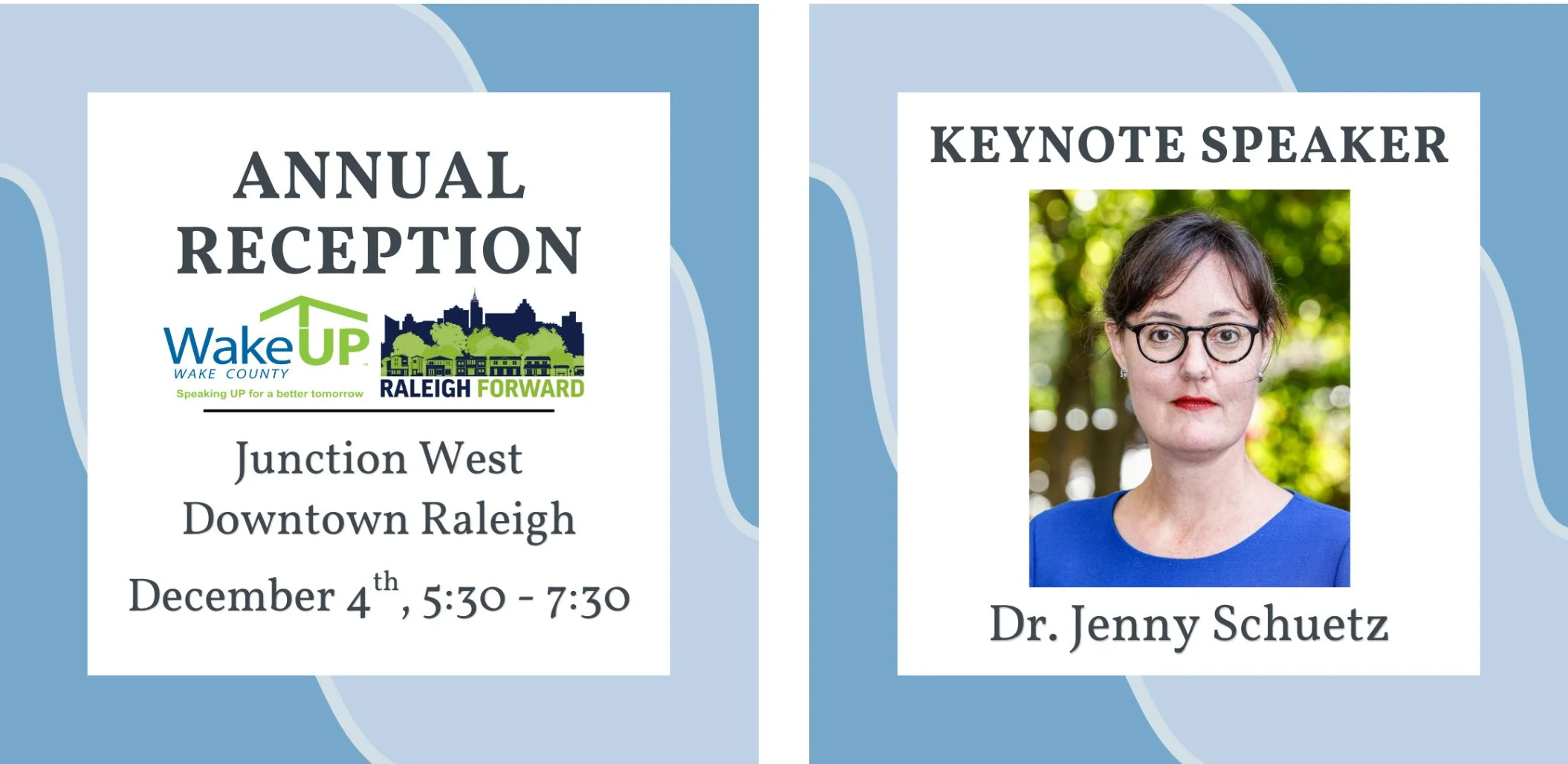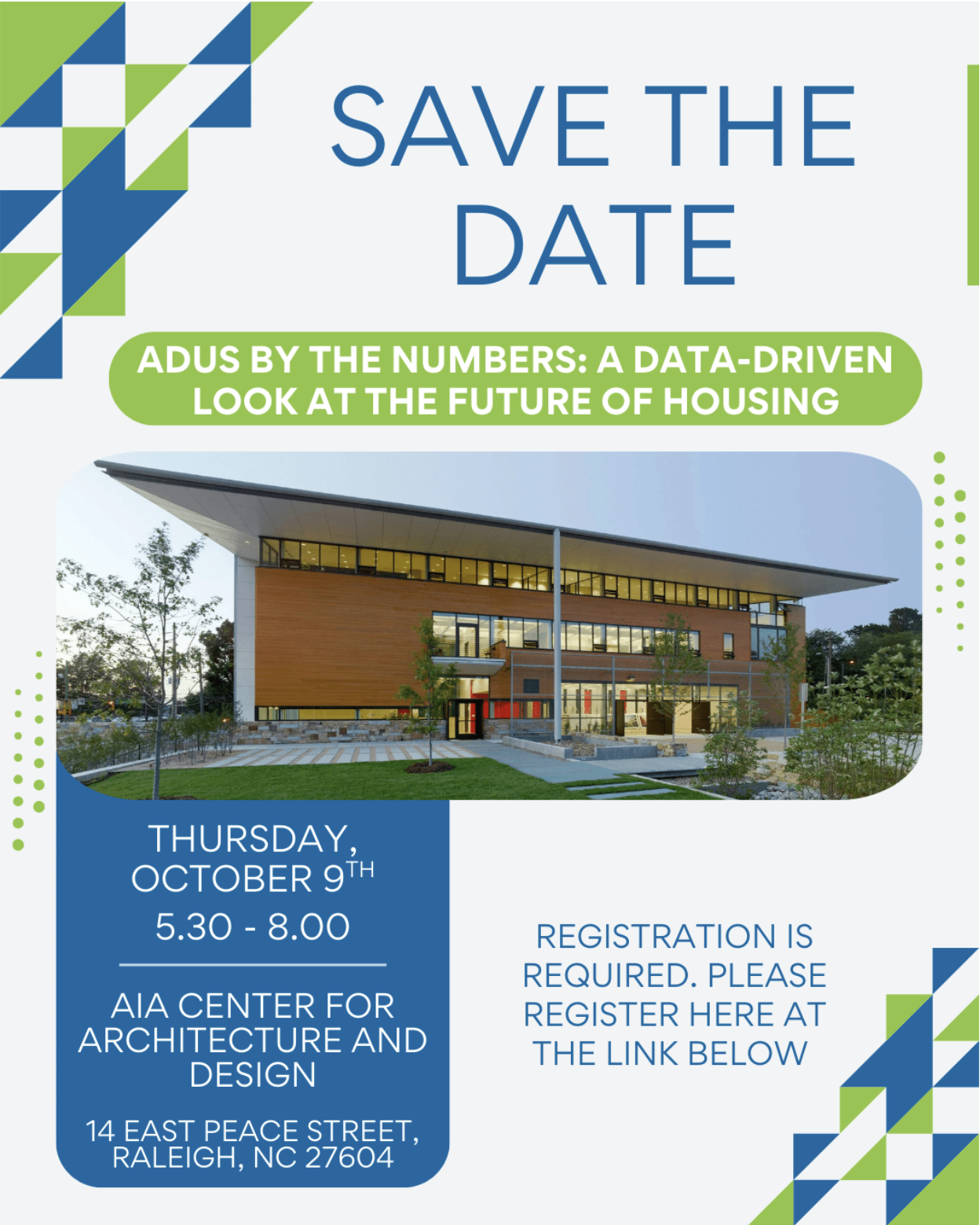September 28, 2025 Newsletter
To receive these updates directly to your inbox, subscribe on Substack.
Save the Date: Annual Reception with WakeUP Wake County on December 4th
Featuring Keynote Speaker Dr. Jenny Schuetz, a prolific writer on housing markets and author of the book, Fixer Upper: How to Repair America’s Broken Housing Systems.
Support Our Mission
If you are interested in sponsoring our joint Annual Reception with WakeUP Wake County, please reach out to us directly!
If you appreciate the newsletters, articles, policy briefs and events that RaleighForward puts together, please consider making a donation today.
We are proud to provide this content free-of-charge. Your support makes this work possible and will empower us to do even more in the near future.
ADUs by the Numbers Event
Raleigh City Council Shifts to 4-Year Staggered Terms with a Primary in 2026
Raleigh voters will see important changes in how City Council elections are conducted beginning in 2026.
In 2024, City Council amended its Charter as permitted by law to:
Expand Council and Mayor terms from two years to four years,
Create staggered elections so that roughly half of Council is elected every two years, and
Adopt the nonpartisan primary and election method instead of the former “plurality” system.
Council adopted its Resolution of Intent on March 19, 2024, held a public hearing on April 2, and passed Ordinance (2024)-627 on May 7, 2024. These actions followed the process authorized by N.C. Gen. Stat. §§ 160A-101 and 160A-102.
How Elections Will Work
Primary: If more than two candidates file for a single district or Mayor’s seat—or if more than double the number of candidates file for the two at-large seats—a nonpartisan primary will be held to narrow the field to two per seat.
Dates for 2026 elections:
Primary: March 3, 2026
General Election: November 3, 2026
Filing Window for Candidates: December 1–19, 2025 (filed with the Wake County Board of Elections, under State Board of Elections procedures).
Which Seats Are 4-Year vs. 2-Year in 2026
The 2026 election will be a transition year:
Four-year terms (next up in 2030):
Mayor
District A
District B
One At-Large seat (the at-large candidate with the highest vote total)
Two-year terms (next up in 2028, then four years thereafter):
District C
District D
District E
The second At-Large seat (the at-large candidate with the second-highest vote total)
After 2028, all seats will be on four-year terms, with elections staggered every two years.
Why It Matters
This shift brings Raleigh into alignment with many peer cities that already use four-year staggered terms. Supporters argue it will:
Provide Council members more time to govern before facing re-election,
Reduce the intensity and cost of near-constant two-year campaigns, and
Strengthen continuity and institutional knowledge within City government.
What to Know if You’re Considering a Run
Filing Window:
Opens: Noon, Monday, December 1, 2025
Closes: Noon, Friday, December 19, 2025
Election Dates:
Primary: Tuesday, March 3, 2026
General Election: Tuesday, November 3, 2026
Who Can File:
Mayor & At-Large: Must be a registered voter residing in Raleigh.
District seats: Must live in the district you seek to represent.
Primary Rules:
Districts: More than two candidates → top two advance.
At-Large: More than four candidates → top four advance (two per seat).
For details, visit: Wake County Board of Elections or NC State Board of Elections.
Articles and Resources of interest:
“Good Cities Can’t Exist without Public Order,” via Noahpinion.
New York Times: “With New Plan, Hochul Fast-Tracks Housing Supply.”
Housing supply may be starting to catch up with demand, but that does not mean Raleigh should start throttling back on new development. News & Observer: “From boom to bargain: Triangle renters gain leverage as market cools.”
Along those same lines, the common theme as pointed out in this blog post is where cities added supply, rents are trending down: “Where Rents are Dropping Faster in 2025.”
As RaleighForward has pointed out, Raleigh’s Missing Middle housing reforms are being challenged by multiple neighborhoods. This article points out how the next phase in the fight for housing reform lies with the courts and judges.
“Rent Control Gets Another Look Amid a National Housing Crisis,” USA Today reports.
“Churches Want to Build Affordable Housing. Why are Cities Stopping Them?” Read the article in Vox.
One of the impediments to building more Missing Middle housing in cities like Raleigh is the state’s prohibition of single-stair buildings. Advocates tried unsuccessfully this year to convince the NC General Assembly to legalize single-stair construction. Here is an article about a reform effort in Nashville, Tennessee.
Here is another article exploring the single-stair issue from a national perspective.
With financing becoming more difficult, particularly with “innovative” housing types, this webinar and recap explores some alternative approaches that could help with some housing types.
Items of Interest in the Week Ahead:
Raleigh City Council does not have a meeting this week. Council did hold its retreat on Saturday, September 27th.
Here is a link to the retreat agenda and the presentations.
Other items of interest:
This brief press conference by Mayor Cowell seemed to fly under the radar, but we think she hits on some very important points in this brief video.
Given the fiscal challenges facing many cities as Federal and State governments cut back on assistance to local governments, Raleigh is taking a proactive approach by starting listening sessions for residents across the City. For details and how to participate, click here.


